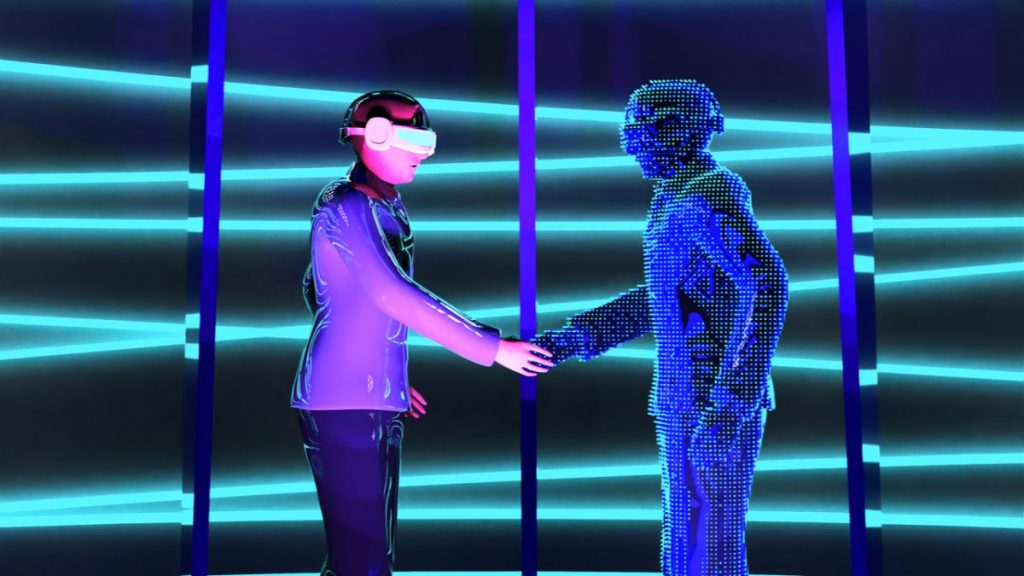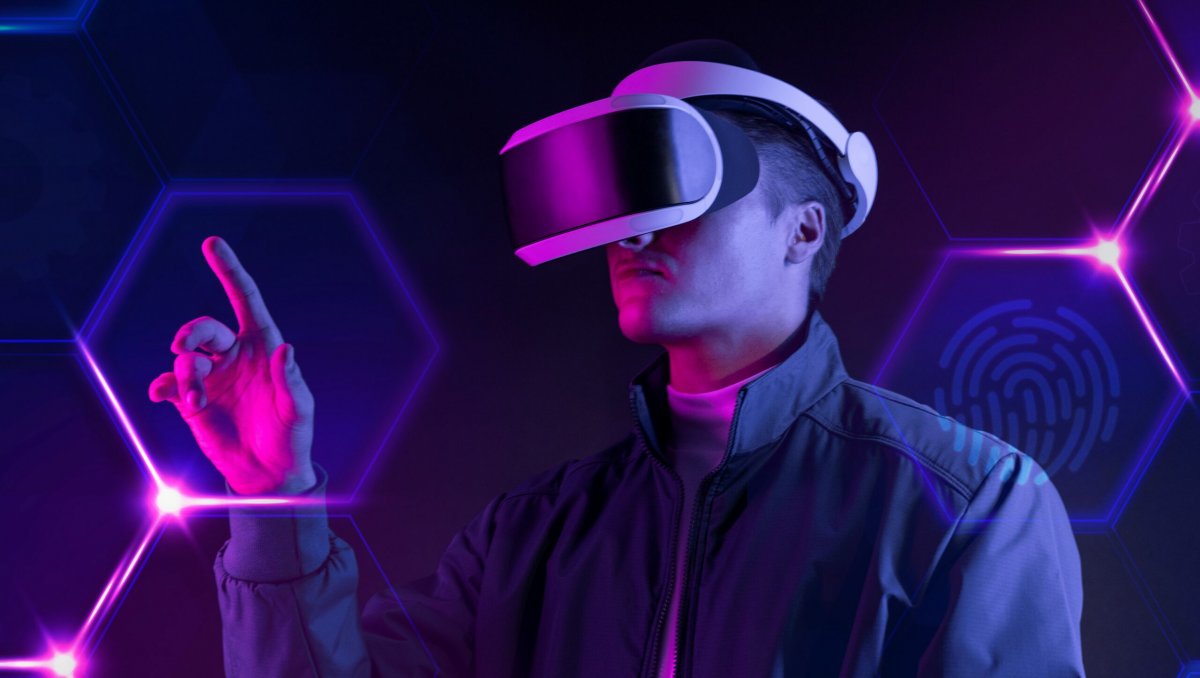[vc_row][vc_column][vc_column_text]Daniel Wigdor is the Director of Research Science at Reality Labs, which acts as a world-class collective of researchers, developers, and engineers to build the future of connection within virtual and augmented reality. In a Q&A, Wigdor reveals some of the biggest misconceptions behind Meta’s evolution, the potential of augmented reality in the Metaverse, and what excites him most about technological innovation.
What do you think is the biggest misconception about the metaverse that needs to be dispelled?
Daniel Wigdor: The metaverse isn’t a single product; it is the interconnecting fabric that will allow people to easily move between embodied 3D experiences and to connect with one another in a way never before possible. It’s the equivalent of moving from intercoms within offices to a fully connected telephone network which allows anyone to call anyone else, regardless of where they buy their hardware. This isn’t something anyone company can or should build alone, and Meta is neither going to build, own, or run the metaverse on its own. It requires collaboration with industry partners, experts, creators, policymakers and others.
Like the internet, the metaverse we envision will be a truly open ecosystem. We don’t want people to get stuck in any one 3D universe. This will require the industry as a whole to work on standards, new norms being established, and new forms of governance being put in place. We have already started to build this principle into our own VR platform. The open nature of our platforms has already led to a diverse range of developers in the AR/VR space, with more than 600,000 creators from 190 countries to date.
Enabling this future will require technological breakthroughs in hardware, which will produce both Augmented Reality (AR) and Virtual Reality (VR) portals into the Metaverse. It’s important to decouple the Metaverse from these exciting technologies, which though necessary to enable it, are just enabling technologies, like how a computer monitor enables the internet but isn’t itself the internet.
What do you think is the greatest potential in regards to the future of the metaverse and its implications on how we engage with each other and do business?
Daniel Wigdor: The mobile internet has already allowed people to work, learn, and socialize in ways that are less limited by their physical location. The metaverse will help expand these opportunities even further.
People will be able to choose to study and train in places that felt off-limits because of where they lived or what they could afford. As we move from remote work to hybrid work — where some people are in offices and others aren’t — the ability to effectively collaborate, wherever you are physically located, will be crucial to ensuring workplaces can be genuinely inclusive. Plus, more people will be able to choose to turn their passions into careers thanks to the metaverse as they won’t have to rely on access to expensive tools, shipping costs, vast workshops, or precious materials in order to produce digital goods & experiences for people to enjoy – from art to clothes, games or live events.
If this is done right, over time, the metaverse will spread economic opportunities and help grow significant sectors of the global economy. Our hope is that within the next decade, the metaverse will reach one billion people, host hundreds of billions of dollars of digital commerce and support jobs for millions of creators and developers.
RELATED: 10 Innovators on What the Future Has in Store for Canadian Tech

What is Canada’s role in building out the metaverse? What contributions are we making towards the bigger picture?
Daniel Wigdor: Canada is a leader in human-computer interaction (HCI) and AI research, and our extended reality (XR) industry is growing. As a result, Canadians are already playing an important role in defining and building for the metaverse, developing new technologies to make it possible, and shaping how we come together in these digital spaces. The 17 research labs across Canada that recently received unrestricted grants from our Reality Labs Research team are a great example of this work that’s already taking place to build the foundational technologies needed for the metaverse, including new computing platforms, new ways for people to interact with technology and new advanced AI models that adapt to us. As we embark on this journey of innovation together, thousands of Canadians will find opportunities in helping build for the metaverse‚both at Meta and alongside us.
How is Meta uniquely leading the conversation in this space (building out the metaverse)?
Daniel Wigdor: Building technologies that bring people together is in our DNA, and we are a social company with investments in technology like VR so it’s a natural evolution for our business. The metaverse is the next frontier in connecting people, just like online social networking was when we got started.
We will be collaborating at every stage — with other companies, developers, experts and policymakers. It’s a long road ahead, but our vision is for the metaverse to reach a billion people in the next decade and create value in people’s lives.
Do you think AR technology is something that only large businesses will be able to effectively leverage? How can small businesses also take advantage of this technology?
Daniel Wigdor: For now, the primary way people will experience the metaverse is through 2D apps, including Facebook, Instagram, Messenger and WhatsApp. And beyond that, we are focused on building bridges from our apps on 2D screens into more immersive virtual 3D experiences in the metaverse.
While it’s an exciting and promising vision, there’s still a long road ahead. Businesses big and small are starting to experiment with early glimmers of the future by using AR and VR to connect with customers and fans in new ways. From AR filter effects to AR ads that allow virtual try-on of clothing and accessories — our tools and products are helping businesses build more brand love and get closer to their customers.
In the future, we imagine business taking their Facebook or Instagram Shop and turning it into a virtual space in the metaverse for people to experience their products and brand just as they would physically in a shop; or car dealers finding new customers if they were to offer virtual test drives in the metaverse that are scheduled on Messenger or WhatsApp.
As more people and businesses adopt this technology to create, discover, and build commerce, more people will be able to access and leverage these tools to help build experiences everyone will enjoy.
Aside from driving commerce, what is the biggest appeal to facilitating an AR experience for companies?
Daniel Wigdor: While VR is focused on connecting people who are physically apart, AR will allow you to be both more present and more connected. In the future, a pair of glasses could give you a digital, interactive layer on top of the real world, so you wouldn’t have to look down at a phone. You’d have the ability to feel physically present with friends and family or interact with customers no matter where in the world they happened to be — all while leveraging contextually aware AI to help navigate the world around you, as well as rich 3D virtual information within arm’s reach.
Simply put, why does the metaverse matter? How do you prove the naysayers and critics wrong?
Daniel Wigdor: The metaverse is the next evolution in social technologies and the successor to the mobile internet. Technology allowed us to write, then talk and now see each other. The metaverse will be the next step – letting us feel like we are sharing a space together.
More importantly, it creates opportunities for creators, businesses, and engineers to explore what’s possible. For businesses and creators, more people are going to have the freedom to find a business model that works for them, and we want to create that opportunity to help them build and reach audiences through different spaces. For engineers, it means providing the opportunity to build technologies that help drive innovation forward for the future of the internet.
It is going to take significant investment over many years before the metaverse reaches scale, but we are very excited about the opportunities it will unlock.

There is an atmosphere of distrust and scepticism, especially for technology and social media companies. What will companies need to do to establish trust when it comes to metaverse and AR technology?
Daniel Wigdor: New innovations bring new challenges, and we have to be responsible in our approach to building this:
- No surprises: In the past, the speed with which new technologies have emerged has sometimes left policymakers and regulators playing catch-up. We don’t want this to happen this time around. A core principle is “don’t surprise people.” That’s why we are having this conversation out in the open, way in advance of all these technologies being launched.
- Collaboration: Partnering with independent experts and organizations will be a crucial part of how we navigate future challenges. We have already launched a two-year $50 million investment in programs and external research, collaborating with industry partners, civil rights groups, governments, nonprofits, and academic institutions to get input as we build these technologies responsibly. This is alongside being a founding member of the XR Association (XRA), which is committed to helping build responsible XR, which includes virtual reality, augmented reality, mixed-reality, and future immersive technology.
- Built-in: While we will need to continue to get better at anticipating risks, we won’t be able to see around every corner. That’s why the principles of privacy, safety and security need to be built in from the start. If we have the principles right, then as a society we will be better at tackling new challenges with these technologies as they arise.
What excites you the most about the future of your work?
Daniel Wigdor: I’m excited about building technologies that put people first, expanding the possibilities of human connection and collaboration. Imagine a world where a lightweight, stylish pair of glasses could replace your need for a computer or smartphone, giving people a more natural way to move through the world without taking you out of the present moment. AR will change how we interact with technology, enhancing everyday settings so that we can stay present with those around us, and engage more deeply and intuitively when focused on work.
[yikes-mailchimp form=”1″ title=”1″ submit=”SUBSCRIBE”][/vc_column_text][/vc_column][/vc_row]













